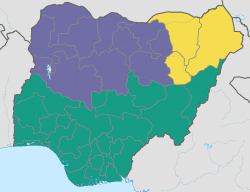
Back Scharia in Nigeria German Sharia en Nigeria Spanish شریعت در نیجریه Persian Charia au Nigeria French Шариат в Нигерии Russian

Sharia plays no role in the judicial system.
Sharia applies only in personal status issues (such as marriage, divorce, inheritance, and child custody), but otherwise the legal system is secular.
Sharia applies in full, including personal status issues and criminal law.
In Nigeria, Sharia has been instituted as a main body of civil and criminal law in twelve Muslim-majority states since 1999, when then-Zamfara State governor Ahmad Sani Yerima[1] began the push for the institution of Sharia at the state level of government. A "declaration of full Sharia law" was made in the twelve states in that year, and the states created Islamic legal institutions such as a Sharia Commission, and Zakat Commission, and a hisbah (a sort of an Islamic police).[2] According to some critics (Leo Igwe, chair of the board of trustees for the Humanist Association of Nigeria), the adoption of Sharia law violates Article 10 of the Nigerian constitution guaranteeing religious freedom.[3]
- ^ Nigeria Sharia architect defends law, BBC News, 21 March 2002
- ^ Mustapha, Abdul Raufu; Ismail, Mustapha (2016). Sharia Implementation in Northern Nigeria Over 15 Years. Policy Brief No.2 The Case of Hisbah (PDF). Nigeria Stability and Reconciliation Program. Retrieved 21 July 2021.
- ^ Cite error: The named reference
kctv5was invoked but never defined (see the help page).